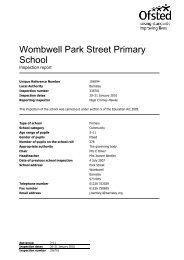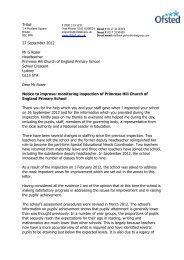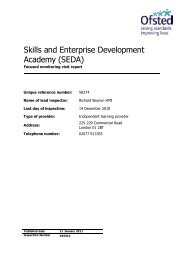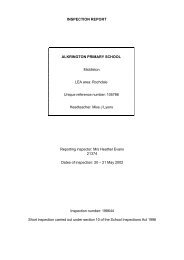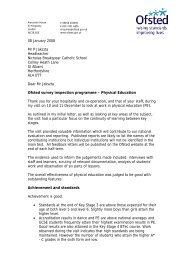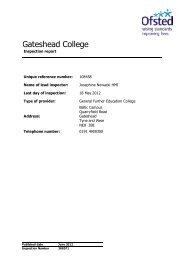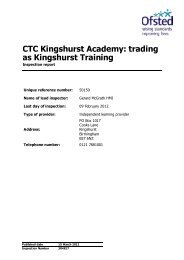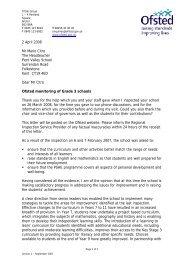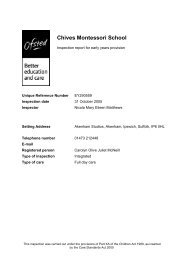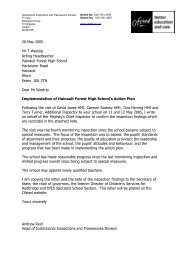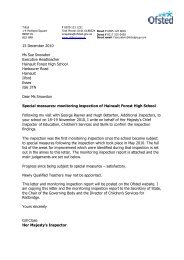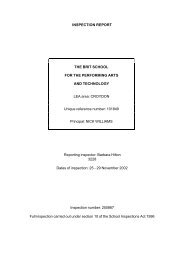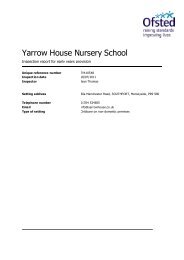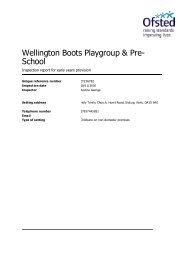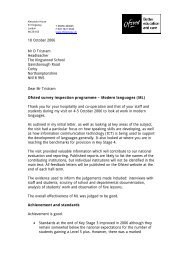Coccinelle - Ofsted
Coccinelle - Ofsted
Coccinelle - Ofsted
Create successful ePaper yourself
Turn your PDF publications into a flip-book with our unique Google optimized e-Paper software.
<strong>Coccinelle</strong><br />
663 Barking Road, London, E13 9EX<br />
Inspection date<br />
Previous inspection date<br />
The quality and standards of the<br />
early years provision<br />
10/09/2012<br />
Not Applicable<br />
This inspection: 3<br />
Previous inspection: Not Applicable<br />
How well the early years provision meets the needs of the range of children who<br />
attend<br />
The contribution of the early years provision to the well-being of children 3<br />
The effectiveness of the leadership and management of the early years provision 3<br />
The quality and standards of the early years provision<br />
This provision is satisfactory<br />
� Children are happy and content within this provision. They demonstrate that they feel<br />
safe and secure as positive attachments with practitioners are evident. The staff team<br />
provide a warm and caring environment where children are comfortable within their<br />
familiar routines.<br />
� Practitioners use consistent and clear boundaries for children who develop a sound<br />
understanding of acceptable behaviour. Children are developing many positive social<br />
skills as they learn to share take-turns and be considerate to others.<br />
� Children are confident to express their wishes to practitioners and their peers. They<br />
enjoy favourite books together and are positively encouraged to share their ideas and<br />
suggestions. This in turn supports children to develop their vocabulary in line with the<br />
developmental milestones for their ages and stages of development.<br />
� Older children thoroughly enjoy being active in their two outdoor play areas. They are<br />
supported to develop their physical skills as they confidently climb, balance and learn to<br />
ride wheeled resources with increasing coordination and control. Children explore and<br />
develop an understanding of their natural world in the sensory garden.<br />
It is not yet good because<br />
� Babies do not have consistent opportunities to be outside and enjoy the benefits of<br />
being in the fresh air and engaging within more physical challenges to support their all<br />
round development.<br />
3
Inspection report: <strong>Coccinelle</strong>, 10/09/2012 2 of 9<br />
� Although babies explore their indoor environment and have easy access to resources,<br />
these are not varied enough to encourage them to fully explore and learn through their<br />
senses.<br />
� Practitioners record some key words in children's home languages; however, there is<br />
little emphasis on providing opportunities for children to use their home language<br />
within their play and learning.<br />
Information about this inspection<br />
Inspections of registered early years provision are scheduled:<br />
� at least once in every inspection cycle. The current cycle ends on 31 July 2016<br />
� more frequently where <strong>Ofsted</strong> identifies a need to do so, for example where provision<br />
was previously judged as inadequate<br />
� brought forward in the inspection cycle where <strong>Ofsted</strong> has received information that<br />
suggests the provision may not be meeting the legal requirements of the Early Years<br />
Foundation Stage; or where assessment of the provision identifies a need for early<br />
inspection<br />
� prioritised for inspection where we have received information that the provision is not<br />
meeting the requirements of the Early Years Foundation Stage and which suggests<br />
children may not be safe<br />
� at the completion of an investigation into failure to comply with the requirements of the<br />
Early Years Foundation Stage.<br />
The provision is also registered on the voluntary and compulsory parts of the Childcare<br />
Register. This report includes a judgment about compliance with the requirements of that<br />
register.<br />
Inspection activities<br />
�<br />
�<br />
�<br />
�<br />
�<br />
The inspector observed activities in the main playroom and within the downstairs<br />
quiet room and in the garden.<br />
The inspector spoke with the practitioners working in the nursery and recorded<br />
observations of their interactions with children.<br />
The inspector had meetings with the manager which included carrying out a joint<br />
observation of a story session.<br />
The inspector looked at children's assessment records, planning documentation,<br />
evidence of suitability of practitioners working within the setting, alongside a range<br />
of other documentation.<br />
The inspector also took account of the views of parents and carers spoken to on the<br />
day of the inspection.
Inspection report: <strong>Coccinelle</strong>, 10/09/2012 3 of 9<br />
Inspector<br />
Siobhan O'Callaghan<br />
Full Report<br />
Information about the setting<br />
<strong>Coccinelle</strong> Ltd Nursery is a privately owned nursery, which has been newly registered in<br />
March 2012. However, this provision has been operating since 1997 and re-registered due<br />
to a change in the nursery becoming a limited company. It operates from the first floor of<br />
a church building situated in the Plaistow area of the London borough of Newham. All<br />
children share access to a large first floor room and two enclosed garden areas, one<br />
sensory and one physical. They also have access to a room downstairs for quieter<br />
activities. Access is via a buzzer at the front door and a flight of stairs leading to the first<br />
floor. The nursery serves the local community and is open each weekday from 8am to<br />
6.30pm all year round.<br />
The nursery is registered on the Early Years Register and the compulsory and voluntary<br />
parts of the Childcare Register. There are currently 20 children from 11 months to under<br />
five years on roll, some in part-time places. The nursery currently supports a number of<br />
children who learn English as an additional language. There are seven members of staff,<br />
all of whom who hold early years qualifications and two staff with early years degree<br />
status. The nursery provides funded early years education for three- and four-year-olds<br />
and is currently part of the two-year-old pilot scheme.<br />
What the setting needs to do to improve further<br />
To meet the requirements of the Early Years Foundation Stage the provider<br />
must:<br />
� ensure that babies have regular opportunities to play outside and enjoy fresh air<br />
and physical challenges, by providing resources such as tunnels, slopes and lowlevel<br />
steps to promote challenge.<br />
To further improve the quality of the early years provision the provider should:<br />
� Develop babies' opportunities to explore and investigate a range of everyday objects<br />
such as the use of treasure baskets.<br />
� Provide opportunities for children to use their home language within their play and<br />
learning.<br />
Inspection judgements
Inspection report: <strong>Coccinelle</strong>, 10/09/2012 4 of 9<br />
How well the early years provision meets the needs of the range of children<br />
who attend<br />
Children enjoy their time in this provision. They demonstrate a positive approach to<br />
learning which is supported by the cheerful interactions of the practitioners caring for<br />
them. Practitioners demonstrate a sound knowledge and understanding of how to engage<br />
and promote children's learning through play. They plan a range of activities and<br />
experiences for children across the seven areas of learning. Although, planning provision<br />
for babies in the outdoor play areas is not currently consistent. Teaching techniques are<br />
sound across the provision, as staff are planning around the needs of their individual key<br />
children. This includes getting children ready for their transition to school. Overall,<br />
practitioners' regular observations of children's progression help to support them in<br />
reaching their milestones.<br />
Children's language development is fostered through regular opportunities to engage<br />
within conversations with their key person and their peers. They particularly enjoy story<br />
sessions where they are encouraged to talk about the events and characters that they<br />
see. Children demonstrate competent listening skills as they listen carefully and respond<br />
appropriately to questions. Overall, children are making satisfactory progress given their<br />
starting points. However, children who learn English as an additional language have too<br />
few opportunities to use their home language within the provision. Children enjoy a wide<br />
range of opportunities to make marks both inside and out in the garden areas. Older<br />
children can recognise their names on their coat pegs and on their portfolios, which they<br />
enjoy sharing with the inspector. It is evident that older children understand that print<br />
carries meaning and enjoy having their own words scribed for them.<br />
Older children enjoy the challenges of counting when they balance and walk along the<br />
plastic shapes within the garden. They have activities that provide opportunities for them<br />
to explore shape and size, as they play with a variety of utensils in the sand tray. Children<br />
build tall and low towers with construction resources and are able to compare these. Older<br />
children are beginning to recognise numbers in their environment and can relate these to<br />
their own ages. Children are developing pleasant social skills which overall help to<br />
promote a positive attitude to learning.<br />
Children benefit from a generally well-resourced learning environment, which supports<br />
their learning across all areas. However, babies do not have sufficient opportunities to<br />
explore a variety of resources that encourage them to learn and investigate through their<br />
senses. Practitioners provide an appropriate range of both adult-led and child-initiated<br />
activities to support children's learning. It is evident that practitioners have established<br />
secure bonds with their key children as they enjoy spending time together.<br />
The contribution of the early years provision to the well-being of children<br />
The provision has established a positive key person system, which supports children to<br />
form secure emotional attachments. Practitioners gather information from parents about<br />
their likes and dislikes. They discuss children's home routines so that these can be
Inspection report: <strong>Coccinelle</strong>, 10/09/2012 5 of 9<br />
followed within the provision. This provides a positive base for children to develop their<br />
independence skills. Overall, children demonstrate a sense of belonging. They enjoy<br />
observing photographs of themselves in their portfolios and looking at evidence of their<br />
artwork. They are confident to access their environment independently and are motivated<br />
to initiate their own activities. Children overall display positive behaviour; they cooperate<br />
with their peers and understand the need to respect others. Older children are supportive<br />
of the younger children and demonstrate their affection towards them.<br />
Babies happily arrive into the setting and settle quickly with their key person who is ready<br />
to greet them. They enjoy exploring their environment in the knowledge that their key<br />
person is close by. Practitioners promote positive role models to children. They provide<br />
consistent boundaries, which support children to understand what acceptable behaviour is.<br />
Children are gaining an understanding about risks as staff discuss with them how they<br />
must use resources in their environment safely. For example, they discuss with children<br />
the possible hazardous consequences of not sitting on their chairs properly. Children know<br />
that they must not go up the slide, as this could be dangerous to themselves and others.<br />
Children are developing positive self-care skills, for example, they confidently use<br />
appropriate cutlery at lunchtime. They know why they must wash their hands before<br />
eating. Children are provided with home cooked foods, which support them in making<br />
healthy choices. For example, they enjoy eating chilli con-carne with rice and confidently<br />
request for more. Children have fruit and vegetables everyday and they are offered milk to<br />
drink. Most children have good opportunities to be active, which supports their overall<br />
health and well-being.<br />
Children are generally well prepared for their transition to school. The provision has<br />
established some positive links with local schools. This enables children to meet their<br />
teachers prior to them starting school. There are sufficient systems in place to share<br />
children's portfolios with both parents and children's future schools.<br />
The effectiveness of the leadership and management of the early years<br />
provision<br />
The manager and proprietor of the provision demonstrate a positive approach to<br />
promoting improvement. They have developed their educational programmes inline with<br />
the Early Years Foundation Stage revised framework. All staff working within the provision<br />
are qualified and experienced to work with children. The manager is positive to develop<br />
their professional skills and knowledge as she ensures that they have access to ongoing<br />
training sessions. This also includes two staff who have almost completed their early years<br />
degrees. Discussions with staff demonstrate that they enjoy working in this provision and<br />
feel well supported by their manager. There are satisfactory systems in place to evaluate<br />
the overall quality of the provision. The manager implements secure recruitment and<br />
induction systems to support the safe management of the nursery.<br />
Staff maintain adequate systems overall to observe, assess and monitor each child's<br />
progress. Although there are no children currently attending with identified needs there
Inspection report: <strong>Coccinelle</strong>, 10/09/2012 6 of 9<br />
are clear procedures in place to initiate appropriate support for children and their families.<br />
The provision works in partnership with other agencies, where appropriate, in order that<br />
children receive the support they need Staff learn key words in children's home languages<br />
in order to show these are valued. However, children are not consistently encouraged to<br />
use their home languages in the provision. Discussions with parents demonstrate that<br />
overall they are very happy with the care and learning opportunities available to their<br />
children. They enjoy having time to meet both formally and informally with their child's<br />
key person. This opportunity allows parents to discuss and find out how their children are<br />
making progress.<br />
The provision has secure safeguarding children procedures in place. Discussions with staff<br />
demonstrate that they are competent in their knowledge and understanding of<br />
safeguarding issues and the procedures to follow. Practitioners work together to provide a<br />
welcoming, safe and child friendly environment. Overall, children are supported to develop<br />
their independence and confidence, which helps to set positive attitudes for their future<br />
learning.<br />
The Childcare Register<br />
The requirements for the compulsory part of the Childcare Register are Met<br />
The requirements for the voluntary part of the Childcare Register are Met<br />
What inspection judgements mean<br />
Registered early years provision<br />
Grade Judgement Description<br />
Grade 1 Outstanding Outstanding provision is highly effective in meeting the needs<br />
of all children exceptionally well. This ensures that children are<br />
very well prepared for the next stage of their learning.<br />
Grade 2 Good Good provision is effective in delivering provision that meets<br />
the needs of all children well. This ensures children are ready<br />
for the next stage of their learning.<br />
Grade 3 Satisfactory Satisfactory provision is performing less well than expectations<br />
in one or more of the key areas. It requires improvement in<br />
order to be good.<br />
Grade 4 Inadequate Provision that is inadequate requires significant improvement<br />
and/or enforcement. The provision is failing to give children an<br />
acceptable standard of early years education and/or is not<br />
meeting the safeguarding and welfare requirements of the
Inspection report: <strong>Coccinelle</strong>, 10/09/2012 7 of 9<br />
Early Years Foundation Stage. It will be inspected again within<br />
12 months of the date of this inspection.<br />
Met The provision has no children on roll. The inspection judgement<br />
is that the provider continues to meet the requirements for<br />
registration.<br />
Not Met The provision has no children on roll. The inspection judgement<br />
is that the provider does not meet the requirements for<br />
registration.<br />
Inspection<br />
This inspection was carried out by <strong>Ofsted</strong> under Sections 49 and 50 of the Childcare Act<br />
2006 on the quality and standards of provision that is registered on the Early Years<br />
Register. The registered person must ensure that this provision complies with the<br />
statutory framework for children’s learning, development and care, known as the Early<br />
Years Foundation Stage.<br />
Setting details<br />
Unique reference number EY440660<br />
Local authority Newham<br />
Inspection number 783365<br />
Type of provision<br />
Registration category Childcare - Non-Domestic<br />
Age range of children 0 - 8<br />
Total number of places 25<br />
Number of children on roll 20<br />
Name of provider <strong>Coccinelle</strong> Ltd<br />
Date of previous inspection Not applicable<br />
Telephone number 02085523340<br />
Any complaints about the inspection or the report should be made following the procedures<br />
set out in the guidance ‘raising concerns and making complaints about <strong>Ofsted</strong>', which is<br />
available from <strong>Ofsted</strong>’s website: www.ofsted.gov.uk. If you would like <strong>Ofsted</strong> to send you a<br />
copy of the guidance, please telephone 0300 123 4234, or email enquiries@ofsted.gov.uk.<br />
Type of provision
Inspection report: <strong>Coccinelle</strong>, 10/09/2012 8 of 9<br />
For the purposes of this inspection the following definitions apply:<br />
Full-time provision is that which operates for more than three hours. These are usually<br />
known as nurseries, nursery schools and pre-schools and must deliver the Early Years<br />
Foundation Stage. They are registered on the Early Years Register and pay the higher fee<br />
for registration.<br />
Sessional provision operates for more than two hours but does not exceed three hours in<br />
any one day. These are usually known as pre-schools, kindergartens or nursery schools<br />
and must deliver the Early Years Foundation Stage. They are registered on the Early Years<br />
Register and pay the lower fee for registration.<br />
Childminders care for one or more children where individual children attend for a period of<br />
more than two hours in any one day. They operate from domestic premises that are<br />
usually their own home. They are registered on the Early Years Register and must deliver<br />
the Early Years Foundation Stage.<br />
Out of school provision may be sessional or full-time provision and is delivered before or<br />
after school and/or in the summer holidays. They are registered on the Early Years<br />
Register and must deliver the Early Years Foundation Stage. Where children receive their<br />
Early Years Foundation Stage in school these providers do not have to deliver the learning<br />
and development requirements in full but should complement the experiences children<br />
receive in school.
Inspection report: <strong>Coccinelle</strong>, 10/09/2012 9 of 9<br />
The Office for Standards in Education, Children's Services and Skills (<strong>Ofsted</strong>) regulates and inspects to<br />
achieve excellence in the care of children and young people, and in education and skills for learners of all<br />
ages. It regulates and inspects childcare and children's social care, and inspects the Children and Family<br />
Court Advisory Support Service (Cafcass), schools, colleges, initial teacher training, work-based learning and<br />
skills training, adult and community learning, and education and training in prisons and other secure<br />
establishments. It assesses council children’s services, and inspects services for looked after children,<br />
safeguarding and child protection.<br />
If you would like a copy of this document in a different format, such as large print or Braille,<br />
please telephone 0300 123 4234, or email enquiries@ofsted.gov.uk.<br />
You may copy all or parts of this document for non-commercial educational purposes, as long<br />
as you give details of the source and date of publication and do not alter the information in any<br />
way.<br />
To receive regular email alerts about new publications, including survey reports and school<br />
inspection reports, please visit our website and go to ‘Subscribe’.<br />
Piccadilly Gate<br />
Store St<br />
Manchester<br />
M1 2WD<br />
T: 0300 123 4234<br />
Textphone: 0161 618 8524<br />
E: enquiries@ofsted.gov.uk<br />
W: www.ofsted.gov.uk<br />
© Crown copyright 2012



